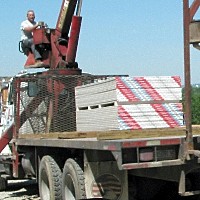A company in Manhattan, Kansas has adapted a nanotech material developed to counter toxic waste into a product that cuts down on sulfur fumes given off by imported drywall installed in homes throughout the U.S. The company, Nanoscale Corporation, uses its FAST-ACT product, which breaks down and removes the corrosive sulfur compounds, thus reducing the foul odor and corrosive effects on wiring and plumbing.
The U.S. Consumer Products Safety Commission has received nearly 3,500 complaints of health problems and corrosion of metal components in homes made with drywall traced to several Chinese manufacturers. The complaints of respiratory illnesses, wiring corrosion, and pipe damage were caused by sulfur compounds such as hydrogen sulfide and sulfur dioxide given off by the drywall.
FAST-ACT is a non-toxic mineral powder composed of the common elements magnesium, titanium, and oxygen. Nanoscale Corp. developed a method to manufacture the compound as a nanocrystalline powder with extremely high surface area; the company says only a few tablespoons have as much surface area as a football field. The surface area allows more interactions between the metal oxides and the toxic molecules, enabling the powder to capture and destroy a large quantity of hazardous chemicals.
Nanoscale Corp. developed a cartridge made with the FAST-ACT material that replaces the air filter in a home furnace. The material is also used in surface treatments, which when combined with the air filter, removes the sulfur compounds causing the corrosion. The company says these methods have in every case so far reduced the corrosion and odor to imperceptible levels within 10 days.
The company was founded by Kansas State University chemist Kenneth Klabunde, who was the first to devise the nanotechnology methods that led to FAST-ACT. National Science Foundation supported Klabunde’s academic research, and later awarded Nanoscale Corp. a Small Business Innovation Research grant to develop its manufacturing processes. The U.S. Department of Defense and other agencies have also supported the company’s work.


 RSS - Posts
RSS - Posts
You must be logged in to post a comment.